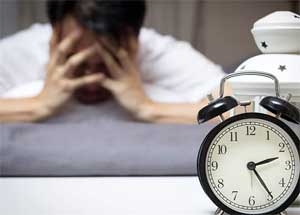- Home
- Editorial
- News
- Practice Guidelines
- Anesthesiology Guidelines
- Cancer Guidelines
- Cardiac Sciences Guidelines
- Critical Care Guidelines
- Dentistry Guidelines
- Dermatology Guidelines
- Diabetes and Endo Guidelines
- Diagnostics Guidelines
- ENT Guidelines
- Featured Practice Guidelines
- Gastroenterology Guidelines
- Geriatrics Guidelines
- Medicine Guidelines
- Nephrology Guidelines
- Neurosciences Guidelines
- Obs and Gynae Guidelines
- Ophthalmology Guidelines
- Orthopaedics Guidelines
- Paediatrics Guidelines
- Psychiatry Guidelines
- Pulmonology Guidelines
- Radiology Guidelines
- Surgery Guidelines
- Urology Guidelines
Sleeping less than 5 hours doubles risk of Heart disease : ESC Update

According to a new study presented at ESC Congress 2018, Sleeping, less than 5 hours doubles the risk of Heart disease.
Study author Ms Moa Bengtsson, of the University of Gothenburg, Sweden, said: "For people with busy lives, sleeping may feel like a waste of time but our study suggests that short sleep could be linked with future cardiovascular disease."
Middle-aged men who sleep five hours or less per night have twice the risk of developing a major cardiovascular event or heart disease during the following two decades than men who sleep seven to eight hours. High blood pressure, diabetes, obesity, current smoking, low physical activity, and poor sleep quality were more common in men who slept five or fewer hours per night compared to those who got seven to eight hours.
Compared to those with normal sleep duration, men who slept five or fewer hours per night had a two-fold higher risk of having a major cardiovascular event by age 71. The risk remained doubled after adjusting for heart disease or cardiovascular risk factors at the start of the study including obesity, diabetes, and smoking.
In 1993, 50% of all men born in 1943 and living in Gothenburg were randomly selected to participate in the study. Of the 1,463 invited, 798 (55%) men agreed to take part. Participants underwent a physical examination and completed a questionnaire on current health conditions, average sleep duration, physical activity, and smoking. The men were divided into four groups according to their self-estimated average sleep duration at the start of the study: five or fewer hours, six hours, seven to eight hours (considered normal sleep duration), and more than eight hours.
Participants were followed-up for 21 years for the occurrence of major cardiovascular events, which included heart attack, stroke, hospitalisation due to heart failure, coronary revascularization, or death from cardiovascular disease. Data on cardiovascular events were collected from medical records, the Swedish Hospital Discharge Registry, and the Swedish Cause of Death Register.
Men with incomplete data on sleep duration, incomplete follow-up information, or who had a major cardiovascular event before the start of the study were excluded, leaving a total of 759 men for the analyses.
Ms Bengtsson said: "Men with the shortest sleep duration at the age of 50 were twice as likely to have had a cardiovascular event by age 71 than those who slept a normal amount, even when other risk factors were taken into account."
She continued: "In our study, the magnitude of increased cardiovascular risk associated with insufficient sleep is similar to that of smoking or having diabetes at age 50. This was an observational study so based on our findings we cannot conclude that short sleep causes cardiovascular disease, or say definitively that sleeping more will reduce risk. However, the findings do suggest that sleep is important - and that should be a wake-up call for all of us."
Previous studies have generated conflicting evidence on whether short sleep is associated with a greater chance of having a future cardiovascular event. This study investigated this relationship in 50-year-old men.

Disclaimer: This site is primarily intended for healthcare professionals. Any content/information on this website does not replace the advice of medical and/or health professionals and should not be construed as medical/diagnostic advice/endorsement or prescription. Use of this site is subject to our terms of use, privacy policy, advertisement policy. © 2020 Minerva Medical Treatment Pvt Ltd